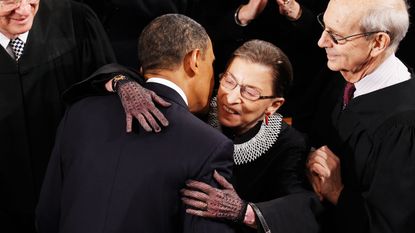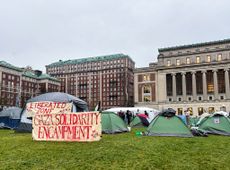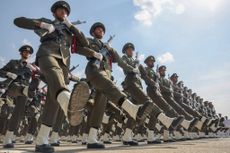US Supreme Court: can Ruth Bader Ginsburg be replaced before the election?
Death of the legal, cultural and feminist icon has triggered row over who should succeed her - and when

US President Donald Trump has announced that he will nominate a woman to replace Ruth Bader Ginsburg, escalating the row over the Supreme Court justice’s successor.
Ginsburg died from pancreatic cancer at the age of 87 on Friday, just weeks before the US election. Democractic presidential candidate Joe Biden has argued that no decision on her replacement should be made until after the vote.
As the BBC notes, “the ideological balance of the nine-member court is crucial to its rulings on the most important issues in US law” - so the outcome of Trump’s bid to have his say will have far-reaching consequences.
Subscribe to The Week
Escape your echo chamber. Get the facts behind the news, plus analysis from multiple perspectives.

Sign up for The Week's Free Newsletters
From our morning news briefing to a weekly Good News Newsletter, get the best of The Week delivered directly to your inbox.
From our morning news briefing to a weekly Good News Newsletter, get the best of The Week delivered directly to your inbox.
Can Trump replace her before the vote?
In short, yes. But the longer answer is that it is a time-consuming process that will be fraught with disputes.
Trump and his party “are expected to move swiftly on filling the High Court vacancy”, says USA Today, but “the process takes time - typically at least two months, based on recent nominations”.
The Time’s US editor David Charter writes that the average time is 67 days - while only 44 days remain until the November election.
“The nomination has to be agreed by a majority vote in the Senate”, which the Republicans control, but “before that the nominee has to undergo confirmation hearings”, Charter writes. “The danger for the Republicans is that a vote before the poll may expose vulnerable candidates and put the party’s control of the Senate at risk.”
Who could replace her?
The Financial Times says that “a leading candidate to replace Ginsburg” is Amy Coney Barrett, who Trump appointed to the US Court of Appeals for the Seventh Circuit in 2017. Axios reported last year that the president was “saving her” for Ginsburg’s seat.
Also believed to be in the running are Barbara Lagoa, the first Hispanic woman to serve on the Florida Supreme Court, and Britt Grant, who the FT says is “close to” the president’s second Supreme Court appointee Brett Kavanaugh.
Other possibles include Joan Larsen, a long-time associate of Conservative legal icon Antonin Scalia, and Allison Eid, who has served on the Court of Appeals for the Tenth Circuit since 2017.
Why the controversy?
Ginsburg served on the Supreme Court for 27 years and was one of only four liberals on the nine-seat bench. Should the Republicans get the vote through, “the balance of power would shift decisively towards the conservatives”, the BBC says.
Trump is “well aware that getting his nominee in would give conservatives control over key decisions for decades to come”, the broadcaster adds, which is why Biden has been so quick to condemn any effort to rush through the president’s favoured pick.
Ginsburg made her feelings clear in the days before her death, writing in a statement to her granddaughter that her “my most fervent wish is that I will not be replaced until a new president is installed”, National Public Radio reports.
Whether she will get her final wish remains to be seen.
Create an account with the same email registered to your subscription to unlock access.
Sign up for Today's Best Articles in your inbox
A free daily email with the biggest news stories of the day – and the best features from TheWeek.com
Joe Evans is the world news editor at TheWeek.co.uk. He joined the team in 2019 and held roles including deputy news editor and acting news editor before moving into his current position in early 2021. He is a regular panellist on The Week Unwrapped podcast, discussing politics and foreign affairs.
Before joining The Week, he worked as a freelance journalist covering the UK and Ireland for German newspapers and magazines. A series of features on Brexit and the Irish border got him nominated for the Hostwriter Prize in 2019. Prior to settling down in London, he lived and worked in Cambodia, where he ran communications for a non-governmental organisation and worked as a journalist covering Southeast Asia. He has a master’s degree in journalism from City, University of London, and before that studied English Literature at the University of Manchester.
-
 'Make legal immigration a more plausible option'
'Make legal immigration a more plausible option'Instant Opinion Opinion, comment and editorials of the day
By Harold Maass, The Week US Published
-
 LA-to-Las Vegas high-speed rail line breaks ground
LA-to-Las Vegas high-speed rail line breaks groundSpeed Read The railway will be ready as soon as 2028
By Peter Weber, The Week US Published
-
 Israel's military intelligence chief resigns
Israel's military intelligence chief resignsSpeed Read Maj. Gen. Aharon Haliva is the first leader to quit for failing to prevent the Hamas attack in October
By Justin Klawans, The Week US Published
-
 Sitting in judgment on Trump
Sitting in judgment on TrumpOpinion Who'd want to be on this jury?
By Susan Caskie Published
-
 'Elevating Earth Day into a national holiday is not radical — it's practical'
'Elevating Earth Day into a national holiday is not radical — it's practical'Instant Opinion Opinion, comment and editorials of the day
By Harold Maass, The Week US Published
-
 Is the Supreme Court about to criminalize homelessness?
Is the Supreme Court about to criminalize homelessness?Talking Points The court will decide if bans on outdoor camping are 'cruel and unusual'
By Joel Mathis, The Week US Published
-
 'Republicans want to silence Israel's opponents'
'Republicans want to silence Israel's opponents'Instant Opinion Opinion, comment and editorials of the day
By Harold Maass, The Week US Published
-
 How could the Supreme Court's Fischer v. US case impact the other Jan 6. trials including Trump's?
How could the Supreme Court's Fischer v. US case impact the other Jan 6. trials including Trump's?Today's Big Question A former Pennsylvania cop might hold the key to a major upheaval in how the courts treat the Capitol riot — and its alleged instigator
By Rafi Schwartz, The Week US Published
-
 'A direct, protracted war with Israel is not something Iran is equipped to fight'
'A direct, protracted war with Israel is not something Iran is equipped to fight'Instant Opinion Opinion, comment and editorials of the day
By Harold Maass, The Week US Published
-
 'Good riddance to the televised presidential debate'
'Good riddance to the televised presidential debate'Instant Opinion Opinion, comment and editorials of the day
By Harold Maass, The Week US Published
-
 Trump's first criminal trial starts with jury picks
Trump's first criminal trial starts with jury picksSpeed Read The former president faces charges related to hush money payments made to adult film star Stormy Daniels
By Peter Weber, The Week US Published